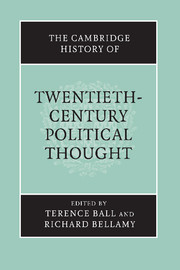Book contents
- Frontmatter
- Editors’ introduction
- Part I The changing fortunes of liberal democracy
- Part II Varieties of Marxism
- 10 The Second International: socialism and social democracy
- 11 The Russian Revolution: an ideology in power
- 12 Asian communism
- 13 Western Marxism
- 14 French Marxism – existentialism to structuralism
- Part III Science, modernism and politics
- Part IV New social movements and the politics of difference
- Part V Beyond Western political thought
- Biographies
- Bibliography
- Subject index
- Name index
- References
12 - Asian communism
from Part II - Varieties of Marxism
Published online by Cambridge University Press: 28 March 2008
- Frontmatter
- Editors’ introduction
- Part I The changing fortunes of liberal democracy
- Part II Varieties of Marxism
- 10 The Second International: socialism and social democracy
- 11 The Russian Revolution: an ideology in power
- 12 Asian communism
- 13 Western Marxism
- 14 French Marxism – existentialism to structuralism
- Part III Science, modernism and politics
- Part IV New social movements and the politics of difference
- Part V Beyond Western political thought
- Biographies
- Bibliography
- Subject index
- Name index
- References
Summary
Historical context
Marxism, initially the product of reflection upon the economic, social and political consequences of the industrial revolution, is firmly anchored in Europe. Its application to Asia, therefore, has been problematic – except on the view that ‘the more advanced countries simply hold up to the less advanced the mirror of their own future’ (Marx 1995, p. 12). In effect, Marxism could only make progress in Asia by adapting to two factors. First, Marxism had to come to terms with indigenous cultural values. Although not every Marxist would agree with U Ba Swe, secretary general of the Burmese Socialist Party, who claimed in 1951 that ‘Marxist theory is not antagonistic to Buddhist philosophy. The two are, frankly speaking, not merely similar. In fact they are the same in concept’ (Trager 1959, p. 11), at least some adaptation to cultural patterns and beliefs was essential. The words of Mao Zedong, ‘for the Chinese communists who are part of the great Chinese nation, flesh of its flesh and blood of its blood, any talk about Marxism in isolation from China’s characteristics is merely Marxism in the abstract, Marxism in a vacuum’ (Mao 1965–77, vol. I, pp. 209ff.), applied mutatis mutandis to all Asian Marxism. Second, Marxism arrived in Asia in support, ostensibly at least, of anti-colonialist and nationalist aspirations. Although in Marx’s more simplistic statements, the workers were considered to have no fatherland, Marxist analyses of imperialism and of nationalist movements in the non-European world became more urgent as the twentieth century progressed.
- Type
- Chapter
- Information
- The Cambridge History of Twentieth-Century Political Thought , pp. 267 - 281Publisher: Cambridge University PressPrint publication year: 2003

